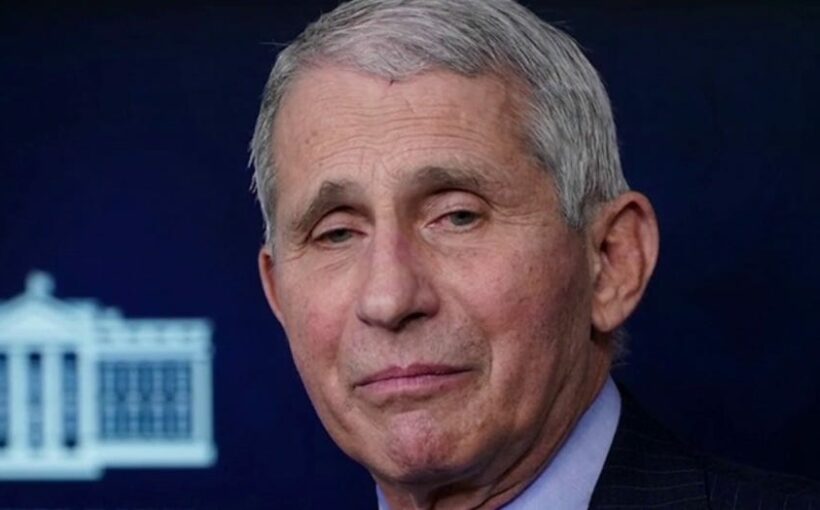Fauci ‘had to know’ about COVID in 2019, failed to help close US border: Chang
Gatestone Institute senior fellow Gordon Chang argues Dr. Anthony Fauci should have predicted that the infectious disease would be highly transmissible.
Exclusive: Anthony Fauci resisted a White House directive in April of last year to cancel a research grant for a nonprofit linked to the Wuhan Institute of Virology but “reluctantly agreed” after he learned that then-President Donald Trump had explicitly ordered its cancellation, according to an exclusive excerpt from a book detailing the Trump administration’s response to the COVID-19 pandemic.
Fauci’s debate with other top officials on how to handle the request was detailed in “Nightmare Scenario: Inside the Trump Administration’s Response to the Pandemic That Changed History,” an upcoming book from Washington Post reporters Yasmeen Abutaleb and Damian Paletta.
The White House pushed the National Institutes of Health to cut funding for a study examining how coronaviruses jump from infected bats to humans following reports linking the research to the Wuhan facility at the center of the “lab leak theory,” which posits the pandemic originated from a lab accident. The study’s sponsor, the nonprofit EcoHealth Alliance, was told not to spend the remaining $369,819 balance of its 2020 grant.
In their book, Abutaleb and Paletta provide a behind-the-scenes account of how Fauci and his colleagues at the National Institutes of Health responded to the White House’s directive:
“With questions swirling about the origins of COVID-19—experts had determined that the virus was not man-made but could not rule out that it might have slipped out of a lab—the NIH had gone to the principal study investigator on April 19 and asked that payments be halted to the subcontractor in Wuhan until it had more answers.
A few days later, the relatively small grant had garnered new attention…On the afternoon of April 24, NIH director Francis Collins and Fauci received notice that Trump wanted to formally announce in a 5:00 p.m. press conference that the grant had been terminated.”
Collins and Fauci told the White House and [the Department of Health and Human Services] that they were not sure the NIH actually had the authority to terminate a peer-reviewed grant in the middle of a budget cycle. The HHS general counsel told them to do it anyway and made clear it was a direct order from the president, implying that their jobs were on the line if they didn’t comply. Fauci and Collins reluctantly agreed to cancel the grant.”
According to the book, Fauci relayed the incident to his longtime friend Peter Staley, the prominent HIV/AIDS activist, who purportedly pushed him to resist the administration’s directive.
“What do you mean?” Staley asked. “You can’t cancel a grant like this.”
“What do you want me to do?” Fauci said.
“Can’t you and Collins threaten to resign over this?” Staley suggested.
“You want us both to resign over a $3.7 million grant?” Fauci snapped back.
Staley instantly backed down. ‘You’re right, you’re right,’ he said. ‘That’s not what you resign over.’”
(Collins and Fauci heard from many members of the scientific community that they should have resigned. The HHS general counsel later found that the agency probably had not had the authority to terminate the grant. NIH had to reinstate the grant but stopped all of its funding.)
It was the second time in a matter of days that it looked as though Fauci was being bullied by political forces at the White House, and Staley thought it was a worrisome trend.
“You combine this with what happened with your Oval Office remdesivir announcement— and I know this doesn’t matter to the country. We’re not talking about Trump and politics and Fox and the whole country. “We’re talking about the fact that you are now our leader in AIDS, in public health advocacy,” he told Fauci, his voice rising with emotion.
“In the scientific community, you are our leader. And in the course of forty-eight hours, you have broken two major tenets of how the scientific community does things. We have these rules for a reason, which you’ve been a major defender of your whole life.”
Fauci did not return a request for comment on the book’s claims by the time of this article’s publication.
EcoHealth Alliance has worked with Wuhan lab researchers in the past but was not actively collaborating with them when the grant was canceled, Politico reported last year.
When testifying at a House Energy & Commerce Hearing in June 2020, Fauci claimed he was unaware of the reason why the grant was canceled.
“Why was it canceled? It was canceled because the NIH was told to cancel it,” Fauci said at the time. “I don’t know the reason, but we were told to cancel it.”
The NIH’s decision to fund research at the Wuhan Institute of Virology is an ongoing point of contention between Fauci and several Republican lawmakers. Sen. Rand Paul and others have alleged that Fauci was aware scientists at the Wuhan lab were conducting “gain of function” research on the virus – a charge Fauci has adamantly denied.
“Nightmare Scenario: Inside the Trump Administration’s Response to the Pandemic That Changed History” will debut on June 29.
Source: Read Full Article


